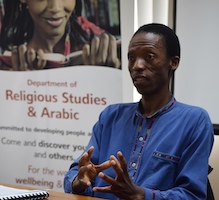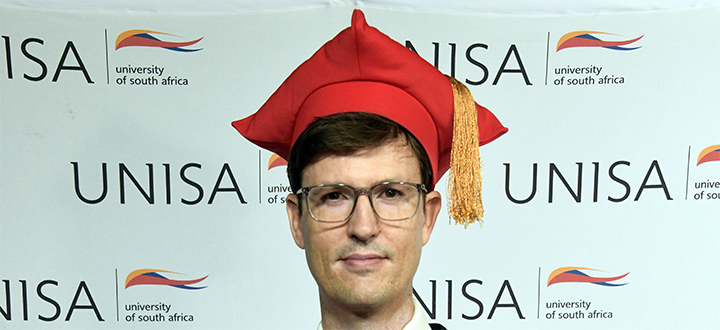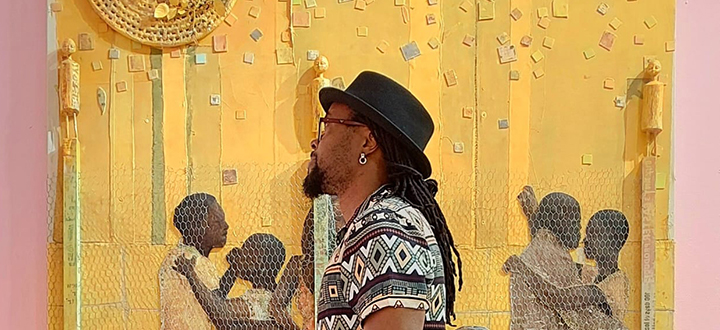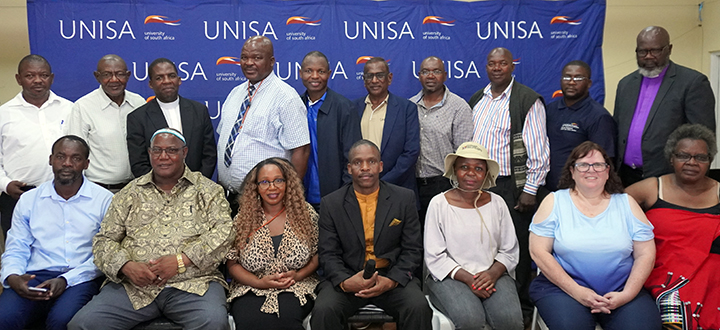College of Human Sciences
From Molimo to the Christian God

Dr Sepetla Molapo
The Department of Religious Studies and Arabic invited Dr Sepetla Molapo from the University of Pretoria to present at a recently held research seminar. Dr Molapo presented on his ongoing research where he interrogates the translation of molimo (God) into the Christian God by protestant Christian missionaries working among the 19th century Sotho speaking people.
Dr Molapo’s paper argued that the protestant Christian missionaries’ translation, removed the idea of molimo from a location among things and imposed it to a being. He said the religion of 19th century Sotho speakers was defined chiefly by its outward manifestation. He said the Sotho word borapeli (religion) is what people did and not what they believed. But the understanding by Protestant Christian missionaries’ translation of molimo into the Christian God emanated from a division Protestant Christianity made between the outside and the inside. A division that prioritised the inside over the outside and consequently reversed the order, structuring the religious outlook of 19th century Sotho speaking people.
Dr Molapo described the distinction made between outside and inside as a crucial aspect of his paper, because it is that distinction which informed the process of the indigenisation of Christianity in Africa.
According to Dr Molapo, Robert Moffat acknowledged upfront that there was a difference in perceptions of molimo because for the Sotho speaking people of that time, the prevailing mythology was molimo as the “Great IT” that is located underground, which was contrary to the protestant missionaries’ idea of Christian God as a Being in the heavens. He added that by virtue of this contradiction, the Sotho speaking people’s idea of molimo the “Great IT” was rendered primitive.
Dr Molapo said Eugene Casalis also felt that entertaining explanations of molimo derived from 19th century Sotho systems of thought ran the risk of recycling apparent misrepresentations. Dr Molapo said Casalis further affirmed that the notion of molimo was awaiting the arrival of the Christian missionaries in order to regain its rightful status as a notion denoting a being.
Furthermore, Dr Molapo in his paper showed that the emerging Christian order of beings rested on writing. He said writing established the order of beings because by virtue of its tendency to freeze life in space, it is opposed to death. And when writing is opposed to death, it delegitimised speech as the primary mode of constituting experience and as this happens, space takes priority over time.
He also said that the consequence of this emerging spatial order is one that terminates the idea of community. Where community ceases to be the experience of the impossible that can only be encountered in its eternal passage and as something that can only be passed on to others but becomes framed in opposition to death.
* By Katlego Pilane (CHS Communications and Marketing)
Publish date: 2019/03/01

 New Unisa partnership set to benefit youth and unemployed graduates
New Unisa partnership set to benefit youth and unemployed graduates
 Passion for music and the arts leads to the highest academic honour
Passion for music and the arts leads to the highest academic honour
 Landmark exhibition reflects Unisa's Pan-African vision
Landmark exhibition reflects Unisa's Pan-African vision
 Unisa paves the way for agricultural resilience and sustainability in the Eastern Cape
Unisa paves the way for agricultural resilience and sustainability in the Eastern Cape
 Unisa empowers communities through school literacy project
Unisa empowers communities through school literacy project